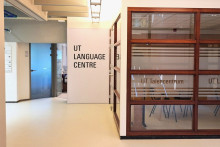Among other things, the policy states that the minimum language level to teach in English must be C1, and that all teachers who score below this level will not be allowed to teach. According to the document, there are currently 1,3% of teachers below the level. What will happen to these teachers?
‘Based on the most recent numbers I received from HR, there are about 18 teachers at the moment whose English isn’t on the required level. All teachers who score below C1 level get advice from us (TCP) on how to improve. Only after they prove that they have followed up on the advice, they can be assessed again. However, until now it wasn’t sanctioned in any way – if they didn’t follow the advice, nothing would really happen. If the new policy is in place, they really won’t be allowed to teach until they pass the assessment. This could mean they can’t teach for quite a while, because if they need to follow a Cambridge course, for example, it can last about 25 weeks.’
Will you be offering new courses – to teachers and others at the UT? The policy specifically mentions English training ‘English as Medium of Instruction’ for teachers.
‘We’ve been offering this course to individual groups at the university for a while already. Teachers from BMS and ET have already undergone it. Now we are discussing if we could make the course a part of our standardized offer. Teachers need to be trained specifically for teaching purposes, their overall proficiency isn’t enough, they often need specific training.’
The policy sets a goal of scoring in top 5 of the Keuzegids in 2020 in regards to UT teachers’ English skills. The UT was in the 13th place in 2017. Do you think this goal is reachable?
‘I honestly don’t know. I think one of the issues here is that many environments at the campus still aren’t very international. That means people can’t practise their English on daily basis. Once the environment changes, their proficiency and fluency will increase. We need to continue the process of internationalization, because it will make people less scared to use English.’
How about Dutch? The Language Policy stresses that ‘the University sees it as its responsibility to arrange support for those who wish to (further) develop their Dutch language skills’. Will you offer additional Dutch training?
‘We already provide Dutch writing courses within Dutch-taught programmes. I can imagine that we will expand this to also English-taught programmes. And we naturally offer Dutch courses for foreigners.’
According to the document, TCP should play a greater role in raising proficiency in English at the UT, which ‘may involve recruitment of additional staff’. Does this mean the Centre will expand?
‘We’ve already expanded in anticipation of the growing demand for English language support as a consequence of Vision 2020. We will continue to work closely with HR and fulfil our advisory role on what should be offered to employees in terms of language training and assessment.’








